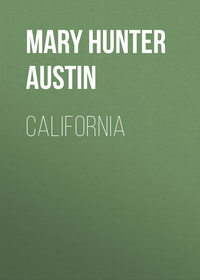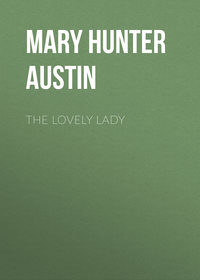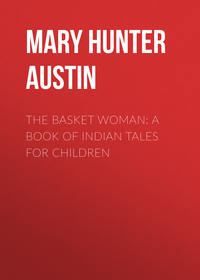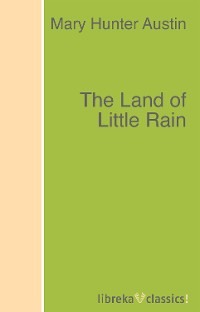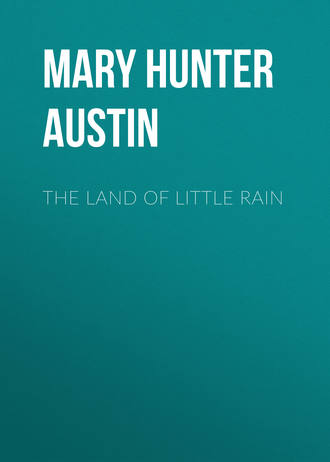 полная версия
полная версияThe Land of Little Rain
The Pocket Hunter had seen destruction by the violence of nature and the violence of men, and felt himself in the grip of an All-wisdom that killed men or spared them as seemed for their good; but of death by sickness he knew nothing except that he believed he should never suffer it. He had been in Grape-vine Cañon the year of storms that changed the whole front of the mountain. All day he had come down under the wing of the storm, hoping to win past it, but finding it traveling with him until night. It kept on after that, he supposed, a steady downpour, but could not with certainty say, being securely deep in sleep. But the weather instinct does not sleep. In the night the heavens behind the hill dissolved in rain, and the roar of the storm was borne in and mixed with his dreaming, so that it moved him, still asleep, to get up and out of the path of it. What finally woke him was the crash of pine logs as they went down before the unbridled flood, and the swirl of foam that lashed him where he clung in the tangle of scrub while the wall of water went by. It went on against the cabin of Bill Gerry and laid Bill stripped and broken on a sand bar at the mouth of the Grape-vine, seven miles away. There, when the sun was up and the wrath of the rain spent, the Pocket Hunter found and buried him; but he never laid his own escape at any door but the unintelligible favor of the Powers.
The journeyings of the Pocket Hunter led him often into that mysterious country beyond Hot Creek where a hidden force works mischief, mole-like, under the crust of the earth. Whatever agency is at work in that neighborhood, and it is popularly supposed to be the devil, it changes means and direction without time or season. It creeps up whole hillsides with insidious heat, unguessed until one notes the pine woods dying at the top, and having scorched out a good block of timber returns to steam and spout in caked, forgotten crevices of years before. It will break up sometimes blue-hot and bubbling, in the midst of a clear creek, or make a sucking, scalding quicksand at the ford. These outbreaks had the kind of morbid interest for the Pocket Hunter that a house of unsavory reputation has in a respectable neighborhood, but I always found the accounts he brought me more interesting than his explanations, which were compounded of fag ends of miner’s talk and superstition. He was a perfect gossip of the woods, this Pocket Hunter, and when I could get him away from “leads” and “strikes” and “contacts,” full of fascinating small talk about the ebb and flood of creeks, the piñon crop on Black Mountain, and the wolves of Mesquite Valley. I suppose he never knew how much he depended for the necessary sense of home and companionship on the beasts and trees, meeting and finding them in their wonted places, – the bear that used to come down Pine Creek in the spring, pawing out trout from the shelters of sod banks, the juniper at Lone Tree Spring, and the quail at Paddy Jack’s.
There is a place on Waban, south of White Mountain, where flat, wind-tilted cedars make low tents and coves of shade and shelter, where the wild sheep winter in the snow. Woodcutters and prospectors had brought me word of that, but the Pocket Hunter was accessory to the fact. About the opening of winter, when one looks for sudden big storms, he had attempted a crossing by the nearest path, beginning the ascent at noon. It grew cold, the snow came on thick and blinding, and wiped out the trail in a white smudge; the storm drift blew in and cut off landmarks, the early dark obscured the rising drifts. According to the Pocket Hunter’s account, he knew where he was, but couldn’t exactly say. Three days before he had been in the west arm of Death Valley on a short water allowance, ankle deep in shifty sand; now he was on the rise of Waban, knee-deep in sodden snow, and in both cases he did the only allowable thing – he walked on. That is the only thing to do in a snowstorm in any case. It might have been the creature instinct, which in his way of life had room to grow, that led him to the cedar shelter; at any rate he found it about four hours after dark, and heard the heavy breathing of the flock. He said that if he thought at all at this juncture he must have thought that he had stumbled on a storm-belated shepherd with his silly sheep; but in fact he took no note of anything but the warmth of packed fleeces, and snuggled in between them dead with sleep. If the flock stirred in the night he stirred drowsily to keep close and let the storm go by. That was all until morning woke him shining on a white world. Then the very soul of him shook to see the wild sheep of God stand up about him, nodding their great horns beneath the cedar roof, looking out on the wonder of the snow. They had moved a little away from him with the coming of the light, but paid him no more heed. The light broadened and the white pavilions of the snow swam in the heavenly blueness of the sea from which they rose. The cloud drift scattered and broke billowing in the cañons. The leader stamped lightly on the litter to put the flock in motion, suddenly they took the drifts in those long light leaps that are nearest to flight, down and away on the slopes of Waban. Think of that to happen to a Pocket Hunter! But though he had fallen on many a wished-for hap, he was curiously inapt at getting the truth about beasts in general. He believed in the venom of toads, and charms for snake bites, and – for this I could never forgive him – had all the miner’s prejudices against my friend the coyote. Thief, sneak, and son of a thief were the friendliest words he had for this little gray dog of the wilderness.
Of course with so much seeking he came occasionally upon pockets of more or less value, otherwise he could not have kept up his way of life; but he had as much luck in missing great ledges as in finding small ones. He had been all over the Tonopah country, and brought away float without happening upon anything that gave promise of what that district was to become in a few years. He claimed to have chipped bits off the very outcrop of the California Rand, without finding it worth while to bring away, but none of these things put him out of countenance.
It was once in roving weather, when we found him shifting pack on a steep trail, that I observed certain of his belongings done up in green canvas bags, the veritable “green bag” of English novels. It seemed so incongruous a reminder in this untenanted West that I dropped down beside the trail overlooking the vast dim valley, to hear about the green canvas. He had gotten it, he said, in London years before, and that was the first I had known of his having been abroad. It was after one of his “big strikes” that he had made the Grand Tour, and had brought nothing away from it but the green canvas bags, which he conceived would fit his needs, and an ambition. This last was nothing less than to strike it rich and set himself up among the eminently bourgeois of London. It seemed that the situation of the wealthy English middle class, with just enough gentility above to aspire to, and sufficient smaller fry to bully and patronize, appealed to his imagination, though of course he did not put it so crudely as that.
It was no news to me then, two or three years after, to learn that he had taken ten thousand dollars from an abandoned claim, just the sort of luck to have pleased him, and gone to London to spend it. The land seemed not to miss him any more than it had minded him, but I missed him and could not forget the trick of expecting him in least likely situations. Therefore it was with a pricking sense of the familiar that I followed a twilight trail of smoke, a year or two later, to the swale of a dripping spring, and came upon a man by the fire with a coffee-pot and frying-pan. I was not surprised to find it was the Pocket Hunter. No man can be stronger than his destiny.
SHOSHONE LAND
It is true I have been in Shoshone Land, but before that, long before, I had seen it through the eyes of Winnenap´ in a rosy mist of reminiscence, and must always see it with a sense of intimacy in the light that never was. Sitting on the golden slope at the campoodie, looking across the Bitter Lake to the purple tops of Mutarango, the medicine-man drew up its happy places one by one, like little blessed islands in a sea of talk. For he was born a Shoshone, was Winnenap´; and though his name, his wife, his children, and his tribal relations were of the Paiutes, his thoughts turned homesickly toward Shoshone Land. Once a Shoshone always a Shoshone. Winnenap´ lived gingerly among the Paiutes and in his heart despised them. But he could speak a tolerable English when he would, and he always would if it were of Shoshone Land.
He had come into the keeping of the Paiutes as a hostage for the long peace which the authority of the whites made interminable, and, though there was now no order in the tribe, nor any power that could have lawfully restrained him, kept on in the old usage, to save his honor and the word of his vanished kin. He had seen his children’s children in the borders of the Paiutes, but loved best his own miles of sand and rainbow-painted hills. Professedly he had not seen them since the beginning of his hostage; but every year about the end of the rains and before the strength of the sun had come upon us from the south, the medicine-man went apart on the mountains to gather herbs, and when he came again I knew by the new fortitude of his countenance and the new color of his reminiscences that he had been alone and unspied upon in Shoshone Land.
To reach that country from the campoodie, one goes south and south, within hearing of the lip-lip-lapping of the great tideless lake, and south by east over a high rolling district, miles and miles of sage and nothing else. So one comes to the country of the painted hills, – old red cones of craters, wasteful beds of mineral earths, hot, acrid springs, and steam jets issuing from a leprous soil. After the hills the black rock, after the craters the spewed lava, ash strewn, of incredible thickness, and full of sharp, winding rifts. There are picture writings carved deep in the face of the cliffs to mark the way for those who do not know it. On the very edge of the black rock the earth falls away in a wide sweeping hollow, which is Shoshone Land.
South the land rises in very blue hills, blue because thickly wooded with ceanothus and manzanita, the haunt of deer and the border of the Shoshones. Eastward the land goes very far by broken ranges, narrow valleys of pure desertness, and huge mesas uplifted to the sky-line, east and east, and no man knows the end of it.
It is the country of the bighorn, the wapiti, and the wolf, nesting place of buzzards, land of cloud-nourished trees and wild things that live without drink. Above all, it is the land of the creosote and the mesquite. The mesquite is God’s best thought in all this desertness. It grows in the open, is thorny, stocky, close grown, and iron-rooted. Long winds move in the draughty valleys, blown sand fills and fills about the lower branches, piling pyramidal dunes, from the top of which the mesquite twigs flourish greenly. Fifteen or twenty feet under the drift, where it seems no rain could penetrate, the main trunk grows, attaining often a yard’s thickness, resistant as oak. In Shoshone Land one digs for large timber; that is in the southerly, sandy exposures. Higher on the table-topped ranges low trees of juniper and piñon stand each apart, rounded and spreading heaps of greenness. Between them, but each to itself in smooth clear spaces, tufts of tall feathered grass.
This is the sense of the desert hills, that there is room enough and time enough. Trees grow to consummate domes; every plant has its perfect work. Noxious weeds such as come up thickly in crowded fields do not flourish in the free spaces. Live long enough with an Indian, and he or the wild things will show you a use for everything that grows in these borders.
The manner of the country makes the usage of life there, and the land will not be lived in except in its own fashion. The Shoshones live like their trees, with great spaces between, and in pairs and in family groups they set up wattled huts by the infrequent springs. More wickiups than two make a very great number. Their shelters are lightly built, for they travel much and far, following where deer feed and seeds ripen, but they are not more lonely than other creatures that inhabit there.
The year’s round is somewhat in this fashion. After the piñon harvest the clans foregather on a warm southward slope for the annual adjustment of tribal difficulties and the medicine dance, for marriage and mourning and vengeance, and the exchange of serviceable information; if, for example, the deer have shifted their feeding ground, if the wild sheep have come back to Waban, or certain springs run full or dry. Here the Shoshones winter flockwise, weaving baskets and hunting big game driven down from the country of the deep snow. And this brief intercourse is all the use they have of their kind, for now there are no wars, and many of their ancient crafts have fallen into disuse. The solitariness of the life breeds in the men, as in the plants, a certain well-roundedness and sufficiency to its own ends. Any Shoshone family has in itself the man-seed, power to multiply and replenish, potentialities for food and clothing and shelter, for healing and beautifying.
When the rain is over and gone they are stirred by the instinct of those that journeyed eastward from Eden, and go up each with his mate and young brood, like birds to old nesting places. The beginning of spring in Shoshone Land – oh the soft wonder of it! – is a mistiness as of incense smoke, a veil of greenness over the whitish stubby shrubs, a web of color on the silver sanded soil. No counting covers the multitude of rayed blossoms that break suddenly underfoot in the brief season of the winter rains, with silky furred or prickly viscid foliage, or no foliage at all. They are morning and evening bloomers chiefly, and strong seeders. Years of scant rains they lie shut and safe in the winnowed sands, so that some species appear to be extinct. Years of long storms they break so thickly into bloom that no horse treads without crushing them. These years the gullies of the hills are rank with fern and a great tangle of climbing vines.
Just as the mesa twilights have their vocal note in the love call of the burrowing owl, so the desert spring is voiced by the mourning doves. Welcome and sweet they sound in the smoky mornings before breeding time, and where they frequent in any great numbers water is confidently looked for. Still by the springs one finds the cunning brush shelters from which the Shoshones shot arrows at them when the doves came to drink.
Now as to these same Shoshones there are some who claim that they have no right to the name, which belongs to a more northerly tribe; but that is the word they will be called by, and there is no greater offense than to call an Indian out of his name. According to their traditions and all proper evidence, they were a great people occupying far north and east of their present bounds, driven thence by the Paiutes. Between the two tribes is the residuum of old hostilities.
Winnenap´, whose memory ran to the time when the boundary of the Paiute country was a dead-line to Shoshones, told me once how himself and another lad, in an unforgotten spring, discovered a nesting place of buzzards a bit of a way beyond the borders. And they two burned to rob those nests. Oh, for no purpose at all except as boys rob nests immemorially, for the fun of it, to have and handle and show to other lads as an exceeding treasure, and afterwards discard. So, not quite meaning to, but breathless with daring, they crept up a gully, across a sage brush flat and through a waste of boulders, to the rugged pines where their sharp eyes had made out the buzzards settling.
The medicine-man told me, always with a quaking relish at this point, that while they, grown bold by success, were still in the tree, they sighted a Paiute hunting party crossing between them and their own land. That was mid-morning, and all day on into the dark the boys crept and crawled and slid, from boulder to bush, and bush to boulder, in cactus scrub and on naked sand, always in a sweat of fear, until the dust caked in the nostrils and the breath sobbed in the body, around and away many a mile until they came to their own land again. And all the time Winnenap´ carried those buzzard’s eggs in the slack of his single buckskin garment! Young Shoshones are like young quail, knowing without teaching about feeding and hiding, and learning what civilized children never learn, to be still and to keep on being still, at the first hint of danger or strangeness.
As for food, that appears to be chiefly a matter of being willing. Desert Indians all eat chuck-wallas, big black and white lizards that have delicate white flesh savored like chicken. Both the Shoshones and the coyotes are fond of the flesh of Gopherus agassizii, the turtle that by feeding on buds, going without drink, and burrowing in the sand through the winter, contrives to live a known period of twenty-five years. It seems that most seeds are foodful in the arid regions, most berries edible, and many shrubs good for firewood with the sap in them. The mesquite bean, whether the screw or straight pod, pounded to a meal, boiled to a kind of mush, and dried in cakes, sulphur-colored and needing an axe to cut it, is an excellent food for long journeys. Fermented in water with wild honey and the honeycomb, it makes a pleasant, mildly intoxicating drink.
Next to spring, the best time to visit Shoshone Land is when the deer-star hangs low and white like a torch over the morning hills. Go up past Winnedumah and down Saline and up again to the rim of Mesquite Valley. Take no tent, but if you will, have an Indian build you a wickiup, willows planted in a circle, drawn over to an arch, and bound cunningly with withes, all the leaves on, and chinks to count the stars through. But there was never any but Winnenap´ who could tell and make it worth telling about Shoshone Land.
And Winnenap´ will not any more. He died, as do most medicine-men of the Paiutes.
Where the lot falls when the campoodie chooses a medicine-man there it rests. It is an honor a man seldom seeks but must wear, an honor with a condition. When three patients die under his ministrations, the medicine-man must yield his life and his office. Wounds do not count; broken bones and bullet holes the Indian can understand, but measles, pneumonia, and smallpox are witchcraft. Winnenap´ was medicine-man for fifteen years. Besides considerable skill in healing herbs, he used his prerogatives cunningly. It is permitted the medicine-man to decline the case when the patient has had treatment from any other, say the white doctor, whom many of the younger generation consult. Or, if before having seen the patient, he can definitely refer his disorder to some supernatural cause wholly out of the medicine-man’s jurisdiction, say to the spite of an evil spirit going about in the form of a coyote, and states the case convincingly, he may avoid the penalty. But this must not be pushed too far. All else failing, he can hide. Winnenap´ did this the time of the measles epidemic. Returning from his yearly herb gathering, he heard of it at Black Rock, and turning aside, he was not to be found, nor did he return to his own place until the disease had spent itself, and half the children of the campoodie were in their shallow graves with beads sprinkled over them.
It is possible the tale of Winnenap´’s patients had not been strictly kept. There had not been a medicine-man killed in the valley for twelve years, and for that the perpetrators had been severely punished by the whites. The winter of the Big Snow an epidemic of pneumonia carried off the Indians with scarcely a warning; from the lake northward to the lava flats they died in the sweat-houses, and under the hands of the medicine-men. Even the drugs of the white physician had no power.
After two weeks of this plague the Paiutes drew to council to consider the remissness of their medicine-men. They were sore with grief and afraid for themselves; as a result of the council, one in every campoodie was sentenced to the ancient penalty. But schooling and native shrewdness had raised up in the younger men an unfaith in old usages, so judgment halted between sentence and execution. At Three Pines the government teacher brought out influential whites to threaten and cajole the stubborn tribes. At Tunawai the conservatives sent into Nevada for that pacific old humbug, Johnson Sides, most notable of Paiute orators, to harangue his people. Citizens of the towns turned out with food and comforts, and so after a season the trouble passed.
But here at Maverick there was no school, no oratory, and no alleviation. One third of the campoodie died, and the rest killed the medicine-men. Winnenap´ expected it, and for days walked and sat a little apart from his family that he might meet it as became a Shoshone, no doubt suffering the agony of dread deferred. When finally three men came and sat at his fire without greeting he knew his time. He turned a little from them, dropped his chin upon his knees, and looked out over Shoshone Land, breathing evenly. The women went into the wickiup and covered their heads with their blankets.
So much has the Indian lost of savageness by merely desisting from killing, that the executioners braved themselves to their work by drinking and a show of quarrelsomeness. In the end a sharp hatchet-stroke discharged the duty of the campoodie. Afterward his women buried him, and a warm wind coming out of the south, the force of the disease was broken, and even they acquiesced in the wisdom of the tribe. That summer they told me all except the names of the Three.
Since it appears that we make our own heaven here, no doubt we shall have a hand in the heaven of hereafter; and I know what Winnenap´’s will be like: worth going to if one has leave to live in it according to his liking. It will be tawny gold underfoot, walled up with jacinth and jasper, ribbed with chalcedony, and yet no hymn-book heaven, but the free air and free spaces of Shoshone Land.
JIMVILLE
A BRET HARTE TOWN
When Mr. Harte found himself with a fresh palette and his particular local color fading from the West, he did what he considered the only safe thing, and carried his young impression away to be worked out untroubled by any newer fact. He should have gone to Jimville. There he would have found cast up on the ore-ribbed hills the bleached timbers of more tales, and better ones.
You could not think of Jimville as anything more than a survival, like the herb-eating, bony-cased old tortoise that pokes cheerfully about those borders some thousands of years beyond his proper epoch. Not that Jimville is old, but it has an atmosphere favorable to the type of a half century back, if not “forty-niners,” of that breed. It is said of Jimville that getting away from it is such a piece of work that it encourages permanence in the population; the fact is that most have been drawn there by some real likeness or liking. Not however that I would deny the difficulty of getting into or out of that cove of reminder, I who have made the journey so many times at great pains of a poor body. Any way you go at it, Jimville is about three days from anywhere in particular. North or south, after the railroad there is a stage journey of such interminable monotony as induces forgetfulness of all previous states of existence.
The road to Jimville is the happy hunting ground of old stage-coaches bought up from superseded routes the West over, rocking, lumbering, wide vehicles far gone in the odor of romance, coaches that Vasquez has held up, from whose high seats express messengers have shot or been shot as their luck held. This is to comfort you when the driver stops to rummage for wire to mend a failing bolt. There is enough of this sort of thing to quite prepare you to believe what the driver insists, namely, that all that country and Jimville are held together by wire.
First on the way to Jimville you cross a lonely open land, with a hint in the sky of things going on under the horizon, a palpitant, white, hot land where the wheels gird at the sand and the midday heaven shuts it in breathlessly like a tent. So in still weather; and when the wind blows there is occupation enough for the passengers, shifting seats to hold down the windward side of the wagging coach. This is a mere trifle. The Jimville stage is built for five passengers, but when you have seven, with four trunks, several parcels, three sacks of grain, the mail and express, you begin to understand that proverb about the road which has been reported to you. In time you learn to engage the high seat beside the driver, where you get good air and the best company. Beyond the desert rise the lava flats, scoriæ strewn; sharp-cutting walls of narrow cañons; league-wide, frozen puddles of black rock, intolerable and forbidding. Beyond the lava the mouths that spewed it out, ragged-lipped, ruined craters shouldering to the cloud-line, mostly of red earth, as red as a red heifer. These have some comforting of shrubs and grass. You get the very spirit of the meaning of that country when you see Little Pete feeding his sheep in the red, choked maw of an old vent, – a kind of silly pastoral gentleness that glozes over an elemental violence. Beyond the craters rise worn, auriferous hills of a quiet sort, tumbled together; a valley full of mists; whitish green scrub; and bright, small, panting lizards; then Jimville.


